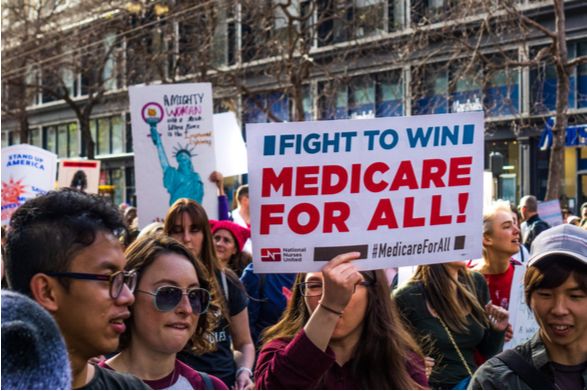When voters say they support Medicare for All, you might want to ask some follow-up questions.
A new study by the Kaiser Family Foundation Health Tracking Poll indicates that most people have enormous misconceptions of what Medicare for All would mean to them.
You would think the term “Medicare For All” would be a clue, but no.
That is how Hot Air sums up the misconceptions found in the KFF survey.
From the survey summary:
The most recent KFF Health Tracking Poll finds majorities across partisans think taxes for most people would increase under a national health plan, sometimes called Medicare-for-all (78 percent), and about half (53 percent) think private health insurance companies would no longer be the primary way Americans would get health coverage under such a plan.
However, when it comes to other key changes that the leading Medicare-for-all bills introduced by Sen. Bernie Sanders and Rep. Pramila Jayapal would bring, large shares are unaware of how the current health care system may be affected.
For example, majorities say people would continue to pay deductibles and co-pays (69 percent) and continue to pay premiums (54 percent) under a Medicare-for-all plan. Likewise, majorities say people with employer-sponsored or self-purchased insurance would be able to keep their plans (55 percent each) under a Medicare-for-all plan.
Medicare for All would, in fact, replace private, or employer-sponsored insurance. Single-payer means one payer and that payer would be the government. Under Medicare for All, if you like your health insurance company, it won’t matter: you won’t be able to keep your health insurance policy.
But the survey found that majorities in both parties don’t realize this:
. . . majorities of both Democrats and independents also believe people with employer-sponsored insurance would be able to keep their current coverage (68 percent and 53 percent), people who purchase their own plans would be able to keep their current coverage (65 percent and 55 percent), and individuals and employers would continue to pay health insurance premiums (61 percent and 53 percent).
A significant percentage of Americans believe that private health insurance would remain the primary way Americans would obtain coverage under a national plan: 39 percent of Democrats, 42 percent of Independents, and 38 percent of Republicans.
Comments from focus groups indicated that some participants didn’t quite grasp that, if you find out that you don’t like Medicare for All, private insurance companies would not be there to offer an alternative:
[Moderator: Do you think Medicare-for-all means that private health insurance companies will go away?]
“No, because they’d be running Medicare-for-all.” (Houston, independent)
“Or even those individuals who can afford to have the type of coverage they want, they wouldn’t want a basic burger. No, they want to add all of the extra fixings because they can afford it.” (Houston, independent)
“They’re going to take a hit obviously but I don’t think that they’re really going to go away. They’re too powerful.” (Harrisburg, Democrat)
“I don’t think for a second that private insurance would go away, even if you implemented this. There will always be the Cadillac plan that is available, because as long as somebody—the market will react.” (Orlando, Democrat)
The first thing opponents of Medicare for All need to do is make sure the public knows what it actually entails. The KFF survey indicates that their work is cut out for them.


